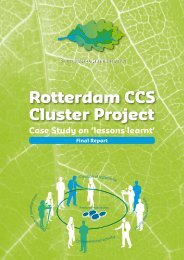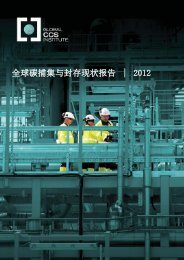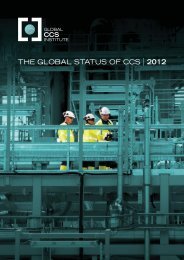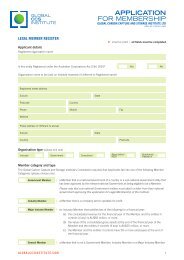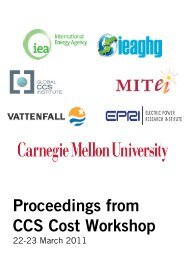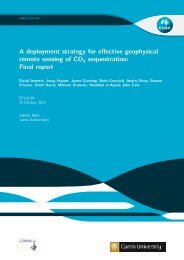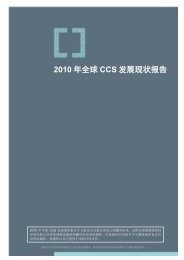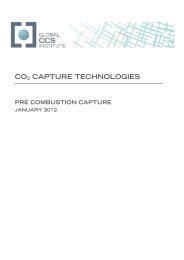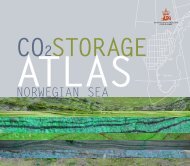Perceptions of CO2 Report - Global CCS Institute
Perceptions of CO2 Report - Global CCS Institute
Perceptions of CO2 Report - Global CCS Institute
- No tags were found...
You also want an ePaper? Increase the reach of your titles
YUMPU automatically turns print PDFs into web optimized ePapers that Google loves.
formed their opinion using the <strong>CCS</strong> information provided and their own values, beliefs, knowledge,ways <strong>of</strong> thinking, and other life experiences.Generally the higher participants self-rated their knowledge, the more concrete their opinions were.This was apparent in the portion <strong>of</strong> neutral opinion decreased as the <strong>CCS</strong> knowledge <strong>of</strong> theparticipants increased. This tendency appears especially clearly in the instance <strong>of</strong> <strong>CCS</strong> “in yourcountry”, as the portion <strong>of</strong> supportive opinion increased as <strong>CCS</strong> knowledge <strong>of</strong> participantsincreased (except <strong>of</strong> those who already knew a lot about <strong>CCS</strong>). However, in terms <strong>of</strong> opinionsabout <strong>CCS</strong> “<strong>of</strong>fshore”, the tendency was weak. This implies it is harder to form opinions about“<strong>CCS</strong> <strong>of</strong>fshore” compared with “<strong>CCS</strong> in your country” by gaining knowledge about <strong>CCS</strong> provided inthis research.To investigate factors related to the formation <strong>of</strong> first opinions on <strong>CCS</strong> implementation, weconducted three regression analyses using opinions on the implementation <strong>of</strong> the three differenttypes <strong>of</strong> <strong>CCS</strong> as dependent variables and characteristics <strong>of</strong> participants as covariates. Table 17 inAppendix F shows the results <strong>of</strong> the best regression. Results showed that the adjusted R-squared(0.134 – 0.173) indicates the regressions did not fully explain the factors that influencerespondents’ opinion formation about <strong>CCS</strong> implementation. This result implies that many otherfactors influence a person’s willingness or support for letting a <strong>CCS</strong> project proceed.Second assessmentAfter additional information was provided, we asked the same set <strong>of</strong> questions in the secondassessment regarding implementation <strong>of</strong> <strong>CCS</strong>. Figure 13Error! Reference source not found.shows the percentage breakdown <strong>of</strong> opinions participants stated for each <strong>of</strong> the threeimplementation questions. The majority <strong>of</strong> respondents (66% for <strong>CCS</strong> “in your country”, 69% for<strong>CCS</strong> “in your neighbourhood”, and 67% for <strong>CCS</strong> “<strong>of</strong>fshore”) maintained the same opinions for eachquestion across the two assessments. Those who changed opinions moved in either a positive ornegative direction; but across the three questions more participants became increasingly negativerather than positive. As a result, in the second assessment the portion <strong>of</strong> neutral opinionsdecreased considerably; and the level <strong>of</strong> negative opinion increased significantly compared withthe first assessment.Figure 13: Opinion on <strong>CCS</strong> implementation by all participants (Second assessment)Note: For clarification, ‘onshore’ in the graph refers to ‘in your neighbourhood’ proximity34 | Understanding how individuals perceive carbon dioxide




